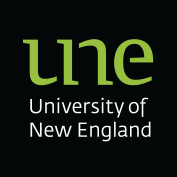In an ever-mediated world, cyber threats are a common issue for us all, but dedicated researchers are determined to fill the gaps in knowledge for people to better understand cyber security.
One of those researchers is UNEBS student Ian Wiltshire. Ian has a long career in Information Technology and is currently researching Cyber Security with focus on the Distributed Denial of Service (DDoS) method of attack, “While there are plenty sources covering attack outcomes and methods of mitigation there was a knowledge gap regarding individuals’ approach to the phenomenon within organisations.”
We spoke to Ian about his current research and his experience studying at UNE as a mature aged student.
“I’m hoping to help create improved understanding of cyber threats, but also more specifically, how individuals consider DDoS as a threat within that threat landscape.”
Many of us have seen cyber threats impacting large scale organisations when they are reported in media but Ian aims to acknowledge smaller scale businesses and individuals when it comes to cyber security, “While we’re starting to see acknowledgement of the wider scale of the threat (such as Scott Morrison’s recent press release on Australia being a target of a state based attack), I’m hoping among other findings, to explore the individual and organisational perspective, to see if there is a consistent point of view.”
Students are faced with many personal and academic challenges along their journey; however, Ian believes perseverance is key during adversity, “There have been several challenges along my journey. Being challenged academically was expected. Learning to hold, understand and analyse the copious amounts of existing academic research and gathering new research on a sensitive subject required higher levels of perseverance.”
But there were also life challenges that came into play. Due to the duration of an HDR course, it’s more likely that you’ll see changes in fundamentals (life/death, employment, accommodation, relationships) than you may during shorter courses. I was certainly challenged by several of these and additionally, this was further compounded by the effect of the Covid -19 pandemic, which saw restrictions imposed on movement and face to face meetings. UNE, my supervisors and I worked together to overcome these challenges, and we found and applied ways to continue in these challenging times.”
“My advice would be to understand that even the most motivated of us, will lack motivation at times. That’s why all the champions in the world have capable coaches to support them on their path to success. They also have a plan. No one wakes up and finds themselves a world champion. They all had a big picture and developed the steps to get themselves there.
If you’re feeling unmotivated, take one of the small tasks and do that.
If it helps others, I divide my tasks in to ‘doing’ type and ‘thinking’ type. Doing type tasks take little thought and little motivation. Thinking type tasks need more motivation and access to the creative side of the mind, so I generally find that the thinking tasks require more quiet time to get prepared and thus are restricted to early mornings and later evenings when the household is quieter. Doing tasks can be done at any time and they’ll keep you moving towards your goal even when you’re not feeling energised.
UNE is a huge organisation, but I’ve always felt included in the community. There is a true community spirt and I’m getting that real ‘University experience’, despite being a remote student. I think this is in part due to the staff who take care to support the students but also in the platforms, which are continuously improved to provide intuitive access.
Overall, I think the way that UNE has adopted a flexible and inclusive approach to the delivery of education, gives them a clear advantage.”
Thanks Ian for your motivational words of advice! We wish you the best of luck with the outcome of your research.


Recent Comments